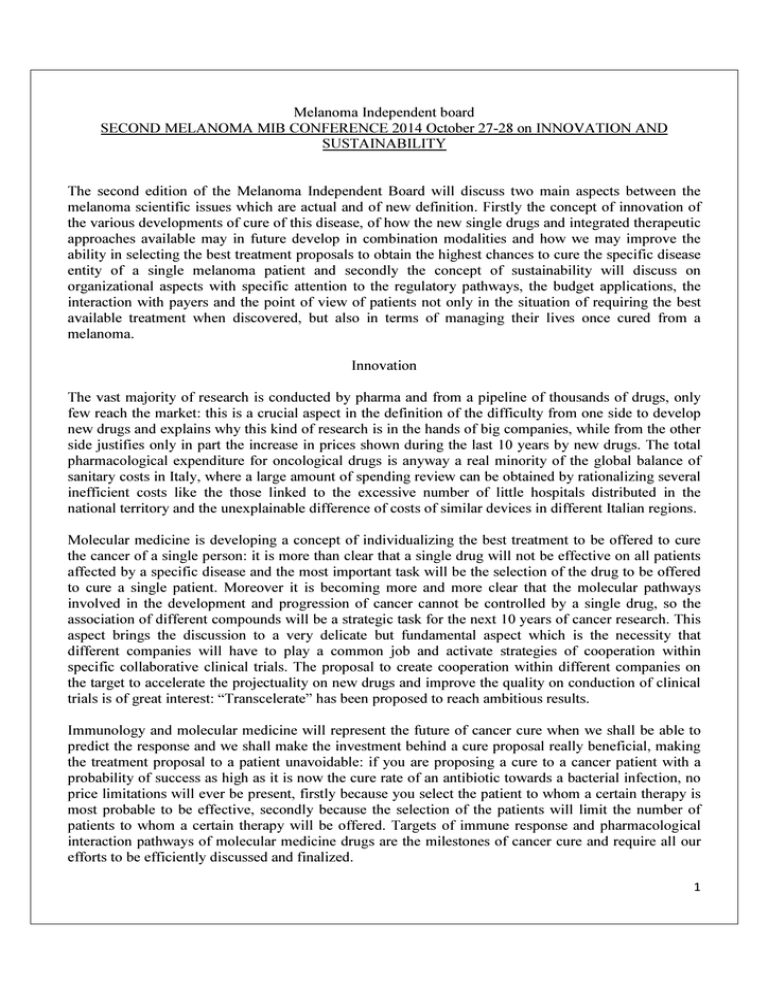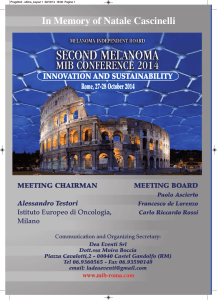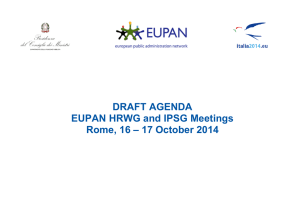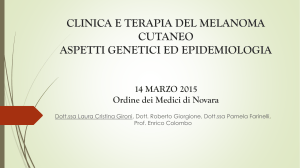Melanoma Independent board SECOND MELANOMA MIB
advertisement

Melanoma Independent board SECOND MELANOMA MIB CONFERENCE 2014 October 27-28 on INNOVATION AND SUSTAINABILITY The second edition of the Melanoma Independent Board will discuss two main aspects between the melanoma scientific issues which are actual and of new definition. Firstly the concept of innovation of the various developments of cure of this disease, of how the new single drugs and integrated therapeutic approaches available may in future develop in combination modalities and how we may improve the ability in selecting the best treatment proposals to obtain the highest chances to cure the specific disease entity of a single melanoma patient and secondly the concept of sustainability will discuss on organizational aspects with specific attention to the regulatory pathways, the budget applications, the interaction with payers and the point of view of patients not only in the situation of requiring the best available treatment when discovered, but also in terms of managing their lives once cured from a melanoma. Innovation The vast majority of research is conducted by pharma and from a pipeline of thousands of drugs, only few reach the market: this is a crucial aspect in the definition of the difficulty from one side to develop new drugs and explains why this kind of research is in the hands of big companies, while from the other side justifies only in part the increase in prices shown during the last 10 years by new drugs. The total pharmacological expenditure for oncological drugs is anyway a real minority of the global balance of sanitary costs in Italy, where a large amount of spending review can be obtained by rationalizing several inefficient costs like the those linked to the excessive number of little hospitals distributed in the national territory and the unexplainable difference of costs of similar devices in different Italian regions. Molecular medicine is developing a concept of individualizing the best treatment to be offered to cure the cancer of a single person: it is more than clear that a single drug will not be effective on all patients affected by a specific disease and the most important task will be the selection of the drug to be offered to cure a single patient. Moreover it is becoming more and more clear that the molecular pathways involved in the development and progression of cancer cannot be controlled by a single drug, so the association of different compounds will be a strategic task for the next 10 years of cancer research. This aspect brings the discussion to a very delicate but fundamental aspect which is the necessity that different companies will have to play a common job and activate strategies of cooperation within specific collaborative clinical trials. The proposal to create cooperation within different companies on the target to accelerate the projectuality on new drugs and improve the quality on conduction of clinical trials is of great interest: “Transcelerate” has been proposed to reach ambitious results. Immunology and molecular medicine will represent the future of cancer cure when we shall be able to predict the response and we shall make the investment behind a cure proposal really beneficial, making the treatment proposal to a patient unavoidable: if you are proposing a cure to a cancer patient with a probability of success as high as it is now the cure rate of an antibiotic towards a bacterial infection, no price limitations will ever be present, firstly because you select the patient to whom a certain therapy is most probable to be effective, secondly because the selection of the patients will limit the number of patients to whom a certain therapy will be offered. Targets of immune response and pharmacological interaction pathways of molecular medicine drugs are the milestones of cancer cure and require all our efforts to be efficiently discussed and finalized. 1 Sustainability The organizational aspects are requiring a new methodology concerning the level of discussion and the rational to guide the decision making processes: new effective treatments are coming available to melanoma patients and we all agree that all new effective therapies should be offered to patients but on the opposite site the NHS budget has to be sustainable as it is not unlimited. This brings the discussion to a setting where different figures should be involved starting from medical experts, pharm company representatives, economists, regulatory agency representatives patients association representatives and media and communication experts; such a panel could be the best scenario to obtain an agreement on the selection of the targets of new therapies, but also on the identification of the characteristics of the centers where a certain treatment could be offered to patients with both the goal of efficacy but also efficiency in terms of costs control. Patients with melanoma have a 85-90% probability to be cured from this disease. Are we sure that this aspect is well considered in a life time project concerning a melanoma patient? In reality there is a discrimination in various environments in which a cured melanoma patient may be involved every day and where instead this individual person is instead excluded as previously affected by a melanoma. What about if a melanoma patient wants to obtain a health insurance or a life insurance or wants to buy a house with a bank loan and he receives a refusal due to the melanoma history? We may cure biologically and clinically a melanoma patient, but our legislation permits to this person to be cured also from the juridical point of view? 2 Two general sessions This meeting will discuss the topics within two main frameworks which appear very different only from a superficial analysis: • • Scientific issues Strategic issues In the next future we shall not be able to offer everything to every patient, but we must be able to offer the best available therapies to the patients who may benefit from it. Science and cancer care can no more improve without a discussion which involves different roles, and the target of this meeting will be to create a productive evaluation where strategic and scientific issues should be put together. An important role has to be dedicated to the validation of diagnostic and therapeutic pathways with the identification of certified regional institutions where both the quality of care and the economical sustainability will be guaranteed. To reach this objective of auditing and survey the discussion needs to identify precise markers of quality through validated methods of cost-benefit evaluation. This approach needs to be proposed by recognized groups (IMI, AIOM, SICO, SIAPEC etc.) and ultimately be approved by national and regional health authorities from whom this activity has been formally devoted. The topics listed below represent the background of the discussion of this second melanoma independent board meeting, from which new topics will be proposed for future discussions and meetings. 3 Roma 27-28 October 2014 AGENDA 27th October First session 10.30 chair Alessandro Testori, Paolo Foggi, Saverio Cinieri, Gordon Mcvie 10.30 “Introduction: The Independent Melanoma Board” 10.40 Alessandro Testori Welcome message from authorities representative of healt Ministry/Assessori salute regionali /AIFA TBC 10.50 ecancermedical science: a new way to manage a scientific journal Gordon Mcvie 11.00 “Melanoma as a model for clinical research: the mile stone trials from WHO Melanoma program in memory of Natale Cascinelli”. Vodafone EORTC Melanoma Group project to sensibilise the population on skin tumors early detection Alessandro Testori 11.10 “Melanoma socio-economic epidemiology” 11.25 Comments 11.30 “Patients associations: the collaboration is ongoing” Sara Gandini Vincenzo de Giorgi Francesco De Lorenzo 11.45 comments Elisabetta Iannelli 11.50 “Sustainability of new drugs in a global vision of NHS costs” Maurizio de Cicco 12.10 comments 12.20 “Sustainability of innovation in Medical Device Industrial offer” 12.35 comments Greta Nasi Ruggero Cadossi Gianni Bellini 12.40 The role of scientific societies in the relationship with regulatory agencies and the public” Carmine Pinto 12.55 comments Paolo Foggi 13.00 Pharmacoeconomy: how to deal with new drugs and related costs? Andrea Messori 13.15 comments Saverio Cinieri 13.20-13.40 discussion 4 Session 1 (preparation of the report by Dr Sara Gandini and Dr Vincenzo De Giorgi) 13.40 lunch and abstract oral presentations (chair Sara Gandini, Vincenzo De Giorgi, Ruggero Ridolfi) Second session chair Nicola Pimpinelli, Francesco De Lorenzo, Michele Maio, Mario Mandalà, Michele Del Vecchio Lunch lecture 14.20 “CTLA-4 and PD-1 combination approaches: is toxicity a marker of efficacy?” Vincenzo Russo 14.40 “The role of mass media in the communication to the public of new therapies” Luciano Onder 15.00 comments Francesco De Lorenzo 15.10 “Pipeline Institutional research: “Costs&Benefit” Giorgio Colombo 15.25 comments Giuseppe Palmieri 15.30 “Sustainability of New drugs for melanoma: the point of view of AIFA Paolo Foggi 15.45 comments Armando Santoro 15.50 “Sustainability of new melanoma drugs: the point of view of the economist Claudio Jommi 16.05 comments Paola Queirolo 16.10 “The management of new melanoma drugs in Italian hospitals: 16.10 “Pharmacy Istituto Nazionale Tumori Milano 16.20 “Pharmacy Istituto Europeo di Oncologia Milano 16.30 comments for both presentations Stefano Federici Emanuela Omodeo Salè Massimo Monturano 16.40-17.00 discussion Session 2 (preparation of the report by Dr Giuseppe Palmieri and Dr Michele Maio) 5 17.00 Third session chair Andrea Messori, Armando Santoro, Paola Queirolo, Francesco Cognetti 17.00 “Ipilimumab and PD-1: from BMS pipeline to clinical practice” Cosimo Paga 17.10 “GSK immunology program: from pipeline to clinical research” Giuseppe Recchia 17.20 “Innovation in melanoma at Roche: from BRAF to multiple targets” Vadlan Antic 17.30 “T-Vec vaccine program in melanoma: Amgen proposals Tom Lillie 17.40 “PD-1 and new drugs projects in MSD” Loredana Orsini 17.50 “Merck serono clinical research plans in melanoma 18.00 “Delcath clinical research plans in melanoma 18.10 “Astra Zeneca clinical research plans in melanoma 18.20 “advanced melanoma unmet needs” Paolo Ascierto 18.35 comments Paolo Marchetti 18.40 Planning Ipilimumab therapy in a single institution” Ruggero Ridolfi 18.55 comments Vanna Chiarion Sileni 19.00 planning anti B-Raf and anti MEK therapy after the end of theraputical use“ Paola Queirolo 19.15 Comments Michele Guida 19.20-19.50 Evening lectures chair Greta Nasi, Alessandro Testori 19.20 “the frontiers of National NHS should have been opened throughout Europe and patients able to choose the country where to be treated” Marianna Cavazza 19.35 Bocconi University in the management of strategies to improve the collaboration between political regional and national health institutions, university and hospitals in defining the priorities.” Claudio Jommi 19.50-20.10 discussion Session 3 (preparation of the report by Dr Vanna Chiarion Sileni and Dr Michele Guida) 20.30 transfer to Group dinner 6 October 28th 8.15 forth session Vanna Chiarion Sileni, Alberto Sobrero, Michele Del Vecchio, Virginia Ferraresi 8.30 “The QALY concept QALY= quality adjusted life year Cost-effectiveness from the payers point of view to patients quantification value ” Bettina Ryll 8.40 comments 8.45 Quality of life projects at different stages of melanoma patients” 8.55 comments 9.00 “Cancer Center certification program in Germany” 9.20 comments 9.30 “Cancer center certification in Italy 9.40 comments 9.50 Transcelerate: pharmaceutical companies are working together” Ruggero Ridolfi Beatrice Colombo Mario Mandalà Claus Garbe Alberto Sobrero Pier Luigi De Riu Maria Teresa Baldini Giuseppe Recchia 10.00 comments Paola Queirolo 10.10 Standard requirements to have a clinical trial unit 10.20 comments Cristina Lupini Domenico Triarico 10.25 “How to manage the pharmaceutical budget in front of new available drugs?” AIFA/ Minister representative ????? 10.35 comments Armando Santoro 10.45 What to do when the hospital budget is spent with new patients to be treated? How to integrate “File F” and hospital budget? Filippo De Braud 10.55 comments 11.10-11.30 Francesco Cognetti discussion Session 4 (preparation of the report by Dr Bettina Ryll and Dr Beatrice Colombo) 7 11.30 fifth session First Round table: 3 slides each presentation to introduce the topic and to start a general discussion The word to patients Clinical and juridical aspects towards a better quality of life Chair and discussion leaders: representative from Institutional Regional health assessorati (i.e. Maria Teresa Baldini Lombardia, ……Lazio …….Campania,……Abruzzo etc.) Dr. Carmine Pinto, Prof. Claudio Jommi, Massimo Giudoboni, Alberto Sobrero, Armando Santoro, Sergio Chimenti 11.30 Where to be cured? What are the aspects that help patients to choose the hospital/doctor to cure his/her disease. 3 slides to introduce the discussion Bettina Ryll 11.35 Patients extra nationally touring: is Italy attractive? 3 slides to introduce the discussion 11.40 When can we consider a melanoma patient clinically cured? 3 slides to introduce the discussion Luca Mondovì Nicola Mozzillo 11.45 Cured melanoma patients and everyday life experiences: are they considered from a juridical point of view normal persons? 3 slides to introduce the discussion Sara Vigna 11.50 Insurance companies approach on cured oncological patients: can we help these people not to be discriminated? 3 slides to introduce the discussion Elisabetta Iannelli 11.55 The role of patients associations to support a new mentality for bank loans and insurance approvals on cured oncological patients 3 slides to introduce the discussion Francesco Di Lorenzo 12.05 Risk management and quality of therapeutical outcomes. Is the concept of Excellency a self referral issue? 3 slides to introduce the discussion Massimo Monturano 8 Round table lectures. 12.10 Sustainability of NHS: the Bocconi University methodology of study 12.25 Oncological patients “Long Survivors”: late side effects to old and new therapies. Claudio Jommi Armando Santoro 12.40-13.30 discussion Session 5 (preparation of the report by Dr Sara Vigna and Dr Massimo Guidoboni) 13.30 lunch and abstract oral presentations (chair Giuseppe Spadola, Corrado Caracò, Giovanni Mazzarol) Sixth session Second Round Table: 3 slides each presentation to introduce the topic and to start a general discussion Scientific issues: the word to laboratory experts 14.30 Chair Ruggero Ridolfi, Massimo Guidoboni, Gianni Gerlini, Massimo Barberis, Armando Santoro, Saverio Cinieri, Virginia Ferraresi 14.30 Prognostic biomarkers for target therapies in melanoma patients: the point of view of molecular pathology. 3 slides to introduce the discussion Massimo C.P. Barberis 14.35 Genetic profiling in melanoma: a step to identify patients susceptibility to target therapy. 3 slides to introduce the discussion Giuseppe Palmieri 14.40 B raf Inhibitors efficacy differencies. 3 slides to introduce the discussion Paola Queirolo 14.45 Identifying susceptibility to immunotherapy: the preclinical point of view. 3 slides to introduce the discussion Maria Rescigno 14.50 Identifying patients susceptibility to immunotherapy: the clinical point of view. 3 slides to introduce the discussion Michele Maio 14.55 Target therapy molecular identification: role of quantitative evaluation. 3 slides to introduce the discussion Gerardo Botti 15.00 Molecular evaluations for target therapy: different results with different methods? 3 slides to introduce the discussion Daniela Massi 9 15.05 Mechanisms of resistance to target therapy. 3 slides to introduce the discussion Paolo Ascierto Round table lecture 15.10 How is basic research helping clinical research in melanoma? Luisa Lanfrancone 15.25-16-30 discussion on the following topics: combination therapies: immunotherapy plus target therapy and conventional therapies can be effective cocktails? Target therapy and immunotherapy: rational for toxicity when combined and sequential combination approaches Session 6 (preparation of the report by Dr Massimo C.P. Barberis and Maria Rescigno) 16.30 Seventh session Technology supporting health practice Chair Prof. Carlo Riccardo Rossi, Dr Carmine Pinto, Dr Sergio Chimenti, Dr Ignazio Stanganelli, Torello Lotti, Lorenzo Borgognoni, Gordon Mcvie 16.20 Mobile health: a step to the future. 16.30 comments Greta Nasi Torello Lotti 16.35 Who cures melanoma patients? The cooperation of Regional authorities and hospital management in certification and validation of “melanoma cancer centers” Greta Nasi 16.50 comments 17.00 Mole mapping in early detection programs of high risk patient 17.10 comments Claus Garbe Ketty Peris Ignazio Stanganelli 17.15 Confocal microscopy: actual role and future developments Giovanni Pellacani 17.25 comments Giuseppe Spadola 17.30 Cost analysis of limb perfusions: a limb saving treatment, orphan of a dedicated DRG and adequate reimbursement Franco di Filippo 17.40 comments Nicola Mozzillo 17.45 Sustainability of new technologies: Cost-Effectiveness analysis for electrochemotherapy on Advanced Melanoma Skin Metastases where DRG is missing. Luca Campana 10 17.55 comments 18.00 the experience of Istituto Tumori Toscano on melanoma programs 18.10 Comments 18.15 Closing lecture. “Collaboration with patients associations: a must for the future.” comments Corrado Caracò Lorenzo Borgognoni Torello Lotti Francesco De Lorenzo Paola Queirolo 18.30 Discussion Conclusions and Planning of next meeting (Rome October 19-20, 2015) Alessandro Testori 11 Adjourn Session 7 (preparation of the report by Dr Giuseppe Spadola and Dr Ignazio Stanganelli) At the end of each session the selected rapporteurs will record a summary of the presentations: Session 1 (preparation of the report by Dr Sara Gandini and Dr Vincenzo De Giorgi) Session 2 (preparation of the report by Dr Giuseppe Palmieri and Dr Michele Maio) Session 3 (preparation of the report by Dr Vanna Chiarion Sileni and Dr Michele Guida) Session 4 (preparation of the report by Dr Bettina Ryll and Dr Beatrice Colombo) Session 5 (preparation of the report by Dr Sara Vigna and Dr Massimo Guidoboni) Session 6 (preparation of the report by Dr Massimo C.P. Barberis and Maria Rescigno) Session 7 (preparation of the report by Dr Giuseppe Spadola and Dr Ignazio Stanganelli) 12 Reports from the seven sessions will focus specifically on: • Italian Regional authorities definition of the authorisational pathway of each treatment by stage and by dedicated institutional contracts: DRG recognized to specific Institutions. • Pharmacological industrial research and cooperation with scientific groups • Patients associations: national and European perspectives • Interaction between patients, doctors, politicians (payers) and regulatory agencies • Interaction of Big Pharma and academic research towards: • Activation of collaborative “spontaneous studies” • Guide lines of research in molecular therapies • Consolidation of immunotherapy in melanoma • The management of the contractual “privilege” of treating melanoma patients • Clinical & diagnostic and therapeutical pathways • Juridical situation of cured melanoma patients • Long term side effects of oncological therapies on cured patients • COLLABORATION WITH PATIENTS ADVOCACY GROUPS: specifically the discussion will be oriented towards the creation of an active collaboration with the federazione italiana delle associazioni di volontariato in oncologia (FAVO) and associazione italiana malati di cancro parenti e amici (AIMaC) and a link at an European level with associations of patients and relatives like European Cancer Patients Coalition (ECPC, prof De Lorenzo), the European Alliance for Personalised Medicine (EAPM) and with the scientific societies like ESMO. First step should be to involve all Italian melanoma associations with the goal of creating a consortium of melanoma patient associations which may bring to the coexistence of the single identities but obtaining the definition of common strategies within the FAVO. • The 7 reports will be the basis for the preparation of a publication on the topics of the meeting. 13 MEETING CHAIRMAN Alessandro Testori Istituto Europeo di Oncologia, Milano MEETING BOARD Paolo Ascierto Francesco De Lorenzo Carmine Pinto Carlo Riccardo Rossi 14 Invited FACULTY list • • • • • • • • • • • • • • • • • • • • • • • • • • • • • • • • • • • • • • • • • Dr.Paolo A. Ascierto Istituto Nazionale dei Tumori Pascale Napoli Dr.ssa Maria Teresa Baldini Consigliere, Regione Lombardia Dr. Massimo C.P. Barberis Istituto Europeo di Oncologia, Milano Dr. Gianni Bellini CEO Rand Biotech Dr. Lorenzo Borgognoni Università di Firenze Prof. Gerardo Botti Istituto Nazionale dei Tumori Pascale, Napoli Dr. Ruggero Cadossi President , IGEA Medical SpA, Carpi Dr. Luca Campana Istituto Oncologico Veneto, Padova Dr. Corrado Caracò Istituto dei Tumori Pascale Napoli Prof.ssa Marianna Cavazza Università Bocconi,Milano Dr.ssa Vanna Chiarion Sileni Istituto Oncologico Veneto, Padova Prof. Sergio Chimenti Clinica Dermatologica Tor Vergata Roma Dr. Saverio Cinieri, ospedale Perrino Brindisi Prof. Francesco Cognetti IFO Istituto Regina Elena, Roma Dott.ssa Beatrice Sofia Colombo IEO Istituto Europeo di Oncologia Milano Prof. Giorgio Colombo, University of Pavia, Dept. of Drug Sciences Dr. Filippo De Braud, Istituto Nazionale Tumori, Milano Dr. Maurizio de Cicco Vice Presidente Farmindustria, CEO Roche Italia Dr. Vincenzo De Giorgi Dip. Scienze Dermatologiche Universita' di Firenze Dr. Francesco De Lorenzo presidente ECPC (european cancer patients coalition) Dr. Michele Del Vecchio Istituto Nazionale Tumori, Milano Pietro Luigi Deriu Istituto Europeo di Oncologia, Milano Dr. Stefano Federici Istituto Nazionale Tumori Milano Dr.ssa Virginia Ferraresi IFO Istituto Regina Elena Roma Prof. Franco Di Filippo Istituto Regina Elena, Roma Dr. Paolo Foggi AIFA Dr.ssa Sara Gandini PhD.Istituto Europeo di Oncologia Milano Dr. Claus Garbe University of Tuebingen Germany Dr. Gianni Gerlini ASL 10 Firenze Dr. Michele Guida Istituto Tumori Giovanni Paolo II, Brindisi Dr. Massimo Guidoboni IRST-IRCCS- Meldola (FC) Avv. Elisabetta Iannelli vicepresidente AIMaC Prof. Claudio Jommi Università del Piemonte Orientale e Cergas Università Bocconi Dott.ssa Luisa Lanfrancone Istituto Europeo di Oncologia Milano Dr. Tom Lillie Amgen Prof. Torello Lotti Università degli Studi Università Guglielmo Marconi, Roma Dr.ssa Cristina Lupini BMS Dr. Michele Maio Policlinico Santa Maria alle Scotte, Siena Dr. Mario Mandalà ospedale Papa Giovanni XXIII di Bergamo Prof. Paolo Marchetti Istituto Dermopatico Dell’Immacolata, Roma Prof.ssa Daniela Massi Università di Firenze 15 Dr. Giovanni Mazzarol Istituto Europeo di Oncologia, Milano Dr. Andrea Messori Azienda Ospedaliera Careggi, Firenze Prof Gordon Mcvie Istituto Europeo di Oncologia Milano Dr. Gian Luca Mondovì Istituti Clinici Humanitas, Rozzano Dr. Massimo Monturano Istituto Europeo di Oncologia Milano Prof.Nicola Mozzillo Istituto Nazionale dei Tumori Pascale Napoli Prof.ssa Greta Nasi Università Bocconi, Milano Dr.ssa Emanuela Omodeo Salè Istituto Europeo di Oncologia, Milano Dr. Luciano Onder Vicedirettore TG2 Dr.ssa Loredana Orsini Merck SD Dr. Cosimo Paga Bristol Myers Squibb Dr. Giuseppe Palmieri CNR, Alghero Prof. Pier Giuseppe Pelicci IFOM-Istituto Europeo di Oncologia, Milano Prof. Giovanni Pellacani Università di Modena e Reggio Emilia Dr. Carmine Pinto AIOM Prof.ssa Ketty Peris Università Gemelli Roma Prof. Nicola Pimpinelli Università di Firenze Dott.ssa Paola Queirolo Istituto Nazionale Tumori di Genova Dr Giuseppe Recchia Glaxo Smith Kline Dr.ssa Maria Rescigno Istituto Europeo di Oncologia San Raffaele Milano Dr. Ruggero Ridolfi Direttore U.O. Immunoterapia e Terapia Cellulare Somatica IOR Meldola • Dr.ssa Bettina Ryll PhD M-Icab (melanoma independent community advisory board) • Prof. Carlo Riccardo Rossi Istituto Oncologico Veneto, Padova • Dr. Vincenzo Russo H. San Raffaele, Milano • Dr. Armando Santoro Istituti clinici Humanitas, Rozzano • Prof. Alberto Sobrero H. San Martino, Genova • Dr. Giuseppe Spadola Istituto Europeo di Oncologia, Milano • Dr. Ignazio Stanganelli IRST Meldola • Dr.ssa Greta Nasi Università Bocconi, Milano • Dr. Domenico Triarico Istituto Europeo di Oncologia, Milano • Dr.ssa Sara Vigna Paziente • Dr. Antic Vladan Roche • • • • • • • • • • • • • • • • • • • • • 16 SPECIFIC ORGANIZATIONAL ASPECTS Invited faculty: Each invited speaker is kindly requested to send an abstract of the presentation before October 5th. Participants: Registration fee 200€ (inclusive of social events) Submission of Oral and Poster abstracts: Abstracts submission for oral and poster presentations: dead line for abstract selection is 21th September; abstract should be 600 words max, one single A4 format, inclusive of figures, 12 character dimension, times new roman character type. Each accepted abstract will permit a free registration for one person to participate to the meeting; no hotel or travel costs will be covered by the organizers for abstracts acceptance. From each session, 2 rapporteurs will make a summary and record an inteview for a publication of the meeting highlights on Ecancermedicalscience. 17


